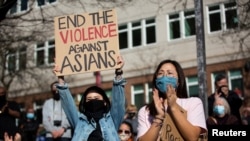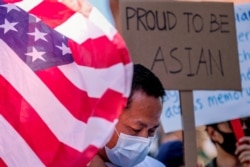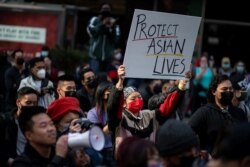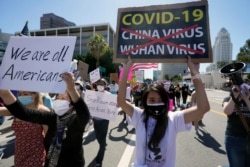Some of the highest concentrations in the U.S. of Vietnamese immigrants and businesses are located in and around Southern California's "Little Saigon," 55 kilometers south of Los Angeles.
Vivian Le lives near Little Saigon. She left Vietnam in 2007 to study in the United States and now works as an accountant. Le says she has a "better life" in the U.S., but news of racist attacks against Asian Americans have made her fearful, even though the city of Westminster where Little Saigon is located has seen only one reported case so far this year of a hate crime against an Asian person, in a city where 47% of its population is Asian.
The other two hate crimes that were reported in 2021 in Westminster are anti-Hispanic and anti-Black crimes. Still, Le is afraid.
"I'm worried about my mom, my family and myself too," she said.
A study of 16 U.S. cities by the Center for the Study of Hate and Extremism at California State University, San Bernardino found a 164% increase in hate crimes reported to police — from 36 cases to 95 in the first quarter of 2021 when compared with the same period in 2020. The cities with the most cases are New York and Los Angeles.
The recent rash of violence against Asian Americans prompted U.S. President Joe Biden to sign into law the COVID-19 Hate Crimes Act. It calls for a point person at the Department of Justice to speed up the review of hate crimes. The legislation also provides grants for training and education against racism.
"I don't think that there's anything new with the kind of racism that's been targeted at Asian Pacific Islanders," said Tyler Diep, a former California politician and Vietnamese immigrant.
Reasons for rise in reports of racism
Diep said the difference is that the mainstream media and society in the U.S. are now finally talking about it.
"I think that with the improvement in technology and surveillance cameras, we're able to see a lot of graphic and tragic incident[s] lately happening in New York and in San Francisco, but it's not rampant," Diep said. "You get pockets of it [racist incidents] here and there. Some are widely covered. Some go on without anybody knowing."
Several incidents in which Asian Americans were attacked ended up on social media and on television. These images have emboldened some Asian Americans to report experiences that had have been kept silent for years.
"When I was a teenager, my family and I in San Jose at the time were victims to an attempted home invasion robbery," said Thien Ho, assistant chief deputy at the Sacramento County District Attorney's Office in Northern California. "And my parents didn't want to report it to the police because we were afraid of retaliation because they were concerned with the language barrier."
Ho and his parents arrived in the U.S. as refugees after fleeing the Vietnamese Communist government in 1976 as boat people. Ho was 4 years old.
"My dad basically stole a uniform from a Communist officer and painted my toy gun black and wearing that uniform and with that toy gun, he was able to get us through different military checkpoints before we made it out to sea," Ho said.
He said feelings of distrust of repressive governments continue within many Asian communities in the U.S., resulting in underreporting of crimes in general.
But now, many Asian Americans are reporting incidents of racism at higher rates. Since March 2020, more than 6,600 racist incidents against Asians have been reported to the Stop AAPI Hate website in English and 11 other languages.
In the organization's May national report, it found the majority of racist incidents, 65%, were verbal harassment. Deliberate avoidance of Asian Americans was the next most prevalent behavior at 18%. Physical assaults made up more than 12% of prejudice experienced by Asian Americans. Other incidents reported to Stop AAPI Hate included workplace discrimination and online harassment.
The organization says it found that 65% of the reports were made by women. Close to 44% of hate incidents were reported by Chinese Americans. The other reports were made by groups including Koreans, Filipinos and Vietnamese Americans.
"We don't know necessarily if there's been a surge. We just know it's clearly widespread," said Russell Jeung, co-founder of Stop AAPI Hate and Asian American studies professor at San Francisco State University.
Hate crimes vs. hate incidents
While civil rights organizations document reports of hate incidents, not every case is a hate crime.
A person yelling a racial slur is not considered a hate crime.
"There's an argument that it is protected speech; however, just because it may be protected speech one time doesn't mean that you shouldn't report it," Ho said.
Reporting a racially motivated incident, even if it is not a hate crime, is necessary, Ho said. If a person who said hateful things to Asians later punched an Asian person, prosecutors will look for a history of racially motivated behavior to determine whether an incident is a crime or a hate crime motivated by racism.
"It could be anything from what they've said to other people," explained Anne Marie Schubert, district attorney for Sacramento County. "What do they post online? Do they have a prior incident of that? That's something that we also want to look at. Is it a pattern for them?"
History repeating itself
Many Asian Americans blame the rise in racist incidents on former U.S. President Donald Trump's political rhetoric calling COVID-19 — the illness caused by the coronavirus — the "Chinese virus." The virus was first detected in China's central city of Wuhan in late 2019.
"If there is a social and political climate, such hate crimes are likely to occur," said Lening Zhang, who teaches sociology and criminal justice at St. Francis University in Pennsylvania.
Stop AAPI Hate's Jeung added, "The fear of the economic distress, the frustration over being quarantined for an entire year, all that anger and fear is now being directed towards Asians. People have to find a scapegoat. And last year the administration scapegoated Chinese people."
Jeung, a fifth generation Chinese American, said history is repeating itself. "My great-grandparents in the 19th century, they were blamed for the diseases of malaria, cholera and leprosy."
Since then, more people from Asia have immigrated to the U.S. for reasons that vary from Vietnamese and Cambodian refugees escaping war and genocide to people from China and Taiwan seeking a higher education and settling in the U.S.
With the COVID-19 pandemic, Chinese Americans are not the only targets of racist acts, in part because many people in the U.S. see Asians as a monolithic group.
"My 16-year-old niece was walking down the street recently and a man drove up in a pickup truck and asked her, 'What is your ethnicity?' She responded, 'I'm Vietnamese.' And when she said that, he mentioned to her that 'because of you and the virus, it's ruined my kids' lives,'" recounted Ho.
Two emerging trends
The reports to Stop AAPI Hate show that lower-income Asian Americans are particularly likely to be victimized by crime.
"Low-income Asian Americans often have to live in high-crime neighborhoods and therefore are susceptible to being victims, facing assault a lot more than other community groups," Jeung said.
"Asian Americans living in dangerous neighborhoods are more likely to face assault and that racism has exacerbated the crimes that we were experiencing in urban areas," Jeung said.
In a study comparing hate crimes against various minority groups, researchers found Asian Americans have a higher chance of being targeted by nonwhite offenders when compared with Hispanic and Black victims.
Zhang said about 25% of hate crimes against Asian Americans are committed by nonwhite offenders.
The perception of the other
"People are using racial lenses to perceive us and then to interact with us," Jeung said.
With racially motivated incidents making the news this year, some Asian immigrants are also examining perceptions within their own communities, where racial lenses are used to view people of other ethnicities.
"I think that no matter what, there's always going to be this underlying tension of we don't understand them. We don't like them as much because we don't understand them or somehow (they're) slightly different," said Diep.
"We can always do better in terms of making sure that we also look in, inward and look in at ourselves to make sure that we are tolerant, make sure that we are accepting of different cultures," Ho added.
"I think at the end of the day we share a lot more in common than we have differences," he said.
Asian protest in US, and solutions
Many Asian Americans have found commonality with the Black Lives Matter movement.
"They've shown how social media attention has really helped to galvanize people, have shown us how to stand up and rally," Jeung said.
Many Asian Americans said the new hate crime legislation is a good first step.
"The roots of racism include the perpetual stereotype, the perpetual foreigner stereotype that we don't belong, and so to change that narrative, we want to educate people," Jeung said. "We want to push for ethnic studies. We want to change the narrative in media. Not everything's a hate crime, but a lot of the discrimination we're facing can be protected through civil action."
But some people wonder if it will be effective in combating racism.
"I don't know if you can get rid of it (racism) because no government can really control people's thoughts and anxiety, so I think the best way to deal with this is public shaming, and we have an understanding that behavior like this one is not, should not be tolerated — to be publicly condemned, so discrimination can be contained," Diep said.










